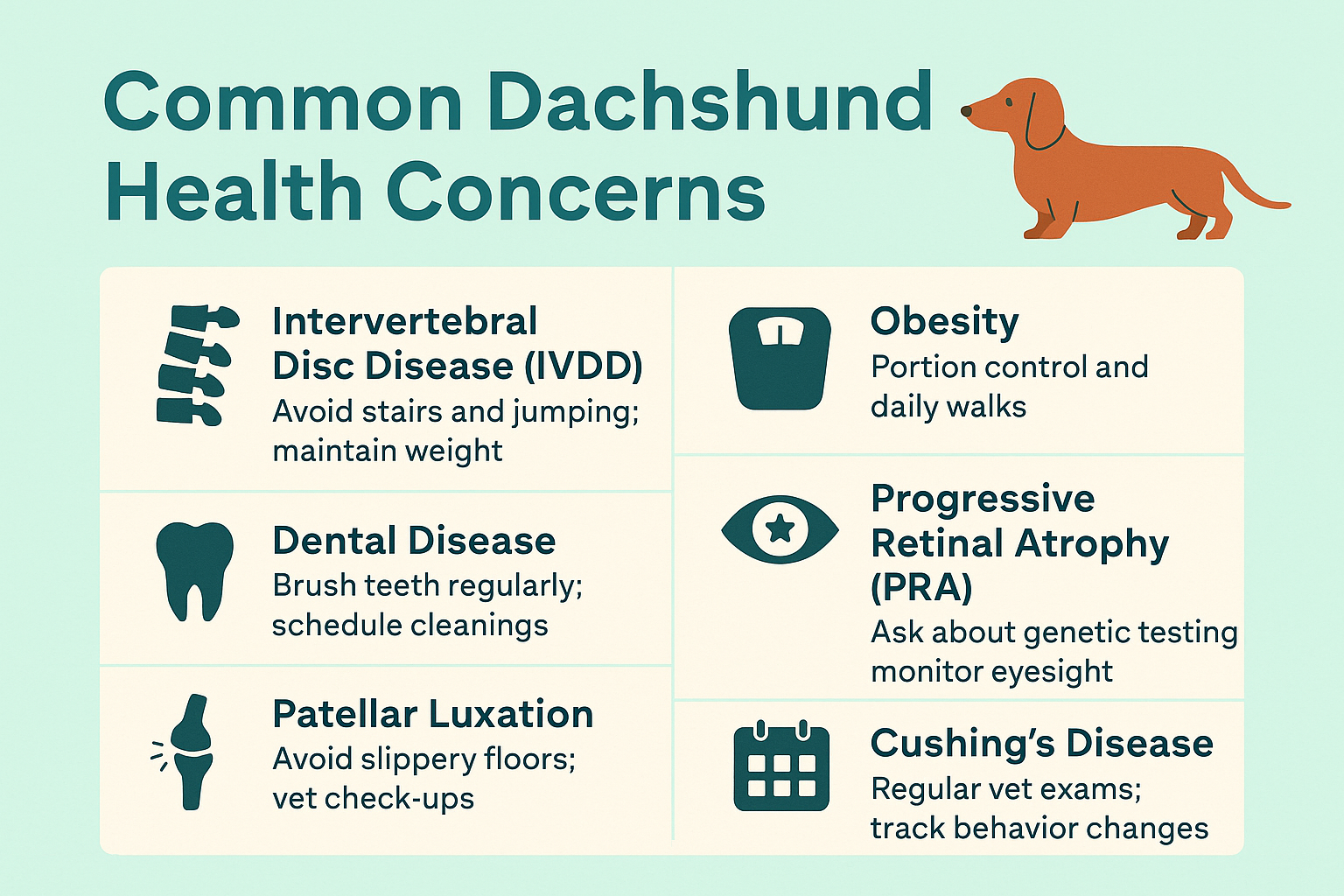Is Your Dachshund at Risk? Common Health Concerns & How to Prevent Them
By Ashley MR · 5 minutes read
Last updated: July 9th, 2025

Dachshunds—affectionately known as “wiener dogs”—are full of personality, loyalty, and charm. But behind those expressive eyes and iconic long backs lies a breed with some specific health risks. As a Dachshund owner or future pup parent, understanding these risks is key to helping your dog live a long, happy, and healthy life.
In this guide, we’ll explore the most common health concerns in Dachshunds, how to spot early symptoms, and practical steps you can take to reduce risks.
Why Dachshunds Are Prone to Certain Health Issues
Dachshunds were originally bred for hunting, but their unique structure—particularly their elongated spine and short legs—makes them susceptible to certain conditions. Responsible care, early detection, and lifestyle management can go a long way in preventing major problems.
6 Common Dachshund Health Problems
1. Intervertebral Disc Disease (IVDD)
What it is: A condition where the discs between the vertebrae in the spine degenerate or herniate, causing pain, nerve damage, or even paralysis.
Symptoms to watch for:
Sudden reluctance to move or jump
Yelping when touched or picked up
Uncoordinated movements or dragging limbs
Prevention tips:
Use ramps instead of stairs or jumps
Keep your Dachshund at a healthy weight
Support their body when lifting
2. Obesity
What it is: Excess weight that strains the spine and joints—especially dangerous for a breed predisposed to back issues.
Symptoms to watch for:
Loss of a visible waistline
Difficulty walking or getting up
Lethargy or reduced interest in play
Prevention tips:
Feed a balanced, portion-controlled diet
Limit treats and table scraps
Encourage daily walks and low-impact exercise
3. Dental Disease
What it is: Plaque and tartar buildup that can lead to gum infections, tooth loss, and even heart issues.
Symptoms to watch for:
Bad breath
Red or bleeding gums
Refusing to eat hard food
Prevention tips:
Brush your Dachshund’s teeth 2–3 times a week
Use dental chews approved by your vet
Schedule annual dental cleanings
4. Patellar Luxation
What it is: A condition where the kneecap slips out of place, more common in smaller breeds.
Symptoms to watch for:
Limping or skipping while walking
Sudden yelping during movement
Leg held at an odd angle
Prevention tips:
Keep your dog’s muscles toned with light exercise
Avoid slippery surfaces
Discuss surgical correction with your vet if needed
5. Progressive Retinal Atrophy (PRA)
What it is: A genetic eye condition that leads to gradual blindness.
Symptoms to watch for:
Trouble seeing at night
Bumping into furniture
Reluctance to go outside in dim light
Prevention tips:
Regular eye exams with your vet
Responsible breeding practices (ask breeders about genetic testing)
6. Cushing’s Disease
What it is: A hormonal disorder caused by overproduction of cortisol.
Symptoms to watch for:
Increased thirst and urination
Pot-bellied appearance
Hair loss or thinning coat
Prevention tips:
Routine bloodwork for senior Dachshunds
Keep an eye on sudden changes in behavior or appearance
Early diagnosis can improve treatment outcomes
Dachshund Health Risk Summary Chart
| Health Concern | Prevention Tip |
|---|---|
| IVDD | Avoid stairs and jumping; maintain weight |
| Obesity | Portion control and daily walks |
| Dental Disease | Brush teeth regularly; schedule cleanings |
| Patellar Luxation | Avoid slippery floors; vet check-ups |
| PRA | Ask about genetic testing; monitor eyesight |
| Cushing’s Disease | Regular vet exams; track behavior changes |
How to Keep Your Dachshund Healthy
In addition to monitoring for specific conditions, here are general health tips for all Dachshund parents:
Maintain a Healthy Weight: Obesity is a trigger for many Dachshund health issues.
Provide Joint Support: Use ramps, orthopedic beds, and carry your dog properly.
Stay Up to Date on Vet Visits: Annual checkups and preventive bloodwork catch problems early.
Support Mental Health: Puzzle toys, training sessions, and daily interaction help prevent boredom and anxiety.
Looking for a Healthy Dachshund Puppy?
At Mawoo Pets, we work only with responsible breeders who perform health checks and genetic testing. Our puppies come from ethical breeding programs that prioritize wellness, temperament, and longevity.
Browse our available Dachshund puppies and learn more about what makes this breed so special.
Frequently Asked Questions
Are Dachshunds prone to back problems?
Yes. Due to their long spine, Dachshunds are especially prone to Intervertebral Disc Disease (IVDD). Preventative care like avoiding stairs and maintaining a healthy weight is key.
How can I help prevent dental disease in my Dachshund?
Brush their teeth several times a week, offer dental treats, and schedule regular professional cleanings.
What is the average lifespan of a Dachshund?
Dachshunds typically live 12 to 16 years when properly cared for, though some can live longer with excellent health management.
Should I get pet insurance for my Dachshund?
Yes, especially for breeds like Dachshunds that are prone to chronic conditions like IVDD or dental disease. It can significantly offset vet costs over time.
Expert-Reviewed by Mawoo Pets
At Mawoo Pets, our grooming blogs are reviewed by licensed breeders and veterinarians to ensure the information is accurate, safe, and easy to follow. We’re here to help pet parents care for their dogs with confidence and consistency.
Explore more helpful articles by visiting our Mawoo Pets Blog!
Related articles
Related puppies for sale
Any questions? Get in touch!
We are here to support you every step of the way. Our concierge service is here daily to answer your questions!
Chat or speak with our team Mon-Sat 9a-9p ET.












